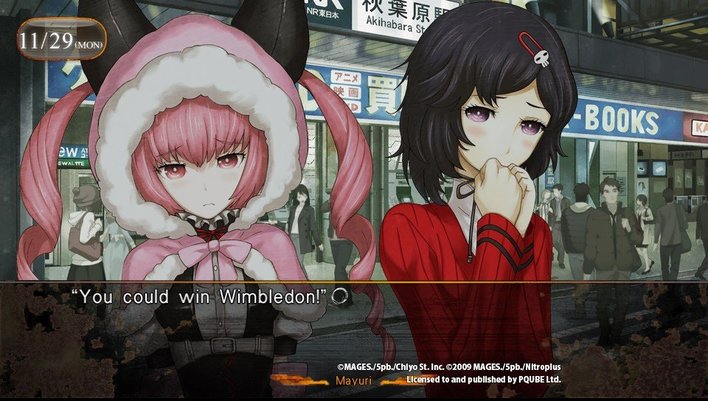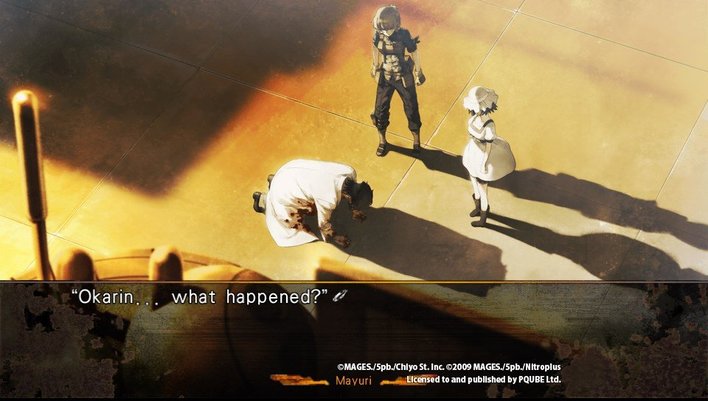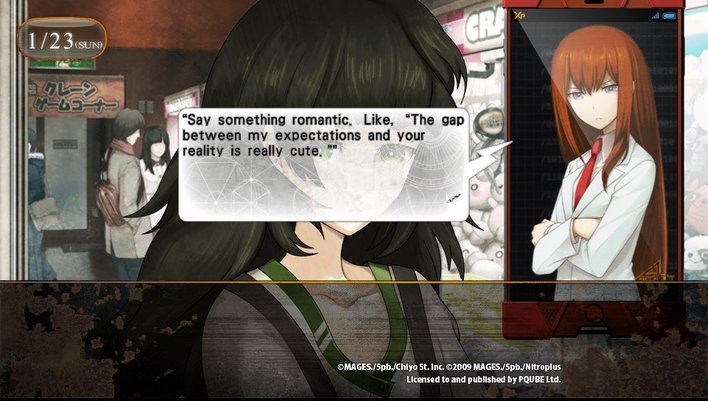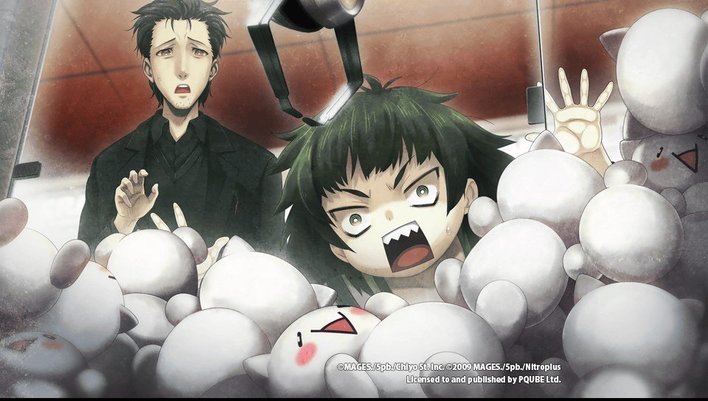Too many games, too little time - it's a problem we know well here at Everybody Plays towers. We have so many amazing titles in our backlog, it's somewhat embarrassing, especially as despite being self-confessed visual novel fiends, we've yet to complete both Danganronpa games, haven't touched Zero Time Dilemma, nor have we even managed to finish off the more recent Root Letter. Until a fortnight ago, we hadn't even attempted to play what many believe is the best of the bunch (wrongly - Danganronpa conquers all - Ed), the time-travelling sci-fi story, Steins;Gate - and then it's sequel landed on our desk to review. Cue a mad rush to zoom through the original game before even daring to set foot in its prequel/sequel/follow-up, Steins;Gate 0 - and boy, are we ever glad we took the time to do our research first, or else we would have really been up the creek without a time-travelling paddle!
CAUTION: From this point on, it's very hard to discuss Steins;Gate 0 without spoiling what happens in either game - we've tried to keep things as vague as possible, but don't say we haven't warned you!
The original Steins;Gate follows a group of nerdy 'otaku' teens in Akihabara, playing at being inventors in their upstairs 'lab'. One day, they accidentally invent a time machine of sorts, uncovering a huge government conspiracy in the process - and what follows quickly turns into a sinister tale of murder, deception, and of course, time travel. Thanks to his unique ability to keep his memories of the future during time leaps, main character Okabe Rintaro takes it upon himself to travel back in time to prevent a friend's untimely death. No small task, he needs to change the past enough that he can steer the future onto a new course; a new 'world line' (essentially parallel universe) with a new outcome, in which his friend survives. However, a small change to the past can have some pretty unexpected consequences in the future…

Of which winning Wimbledon probably isn't one of them...
You see, in the world of Steins;Gate, there are a number of parallel universes that each have their own time lines, called world lines. These world lines twist around each other, occasionally converging in disasters that affect all the world lines - one of which is a devastating third world war. In order to avoid this fate, and save the aforementioned friend, Okabe Rintaro manages to leap from the current 'alpha' world line onto a different 'beta' line - only to find another friend is now in death's sights, and her demise sets the rumblings of war in motion. In the original game, Okabe may manage to time travel and save his friend from her sad fate, but Steins;Gate 0 explores what would happen in the world if he chose not to.
Essentially an alternate ending to the original game, Steins;Gate 0 sees protagonist Okabe suffering from a bad case of PTSD, brought on by the multitude of deaths he's witnessed in his many time travel escapades. As such, he's lost the will to time travel, instead carving out an unhappy existence in the current world line, rather than heading back in time to save his now-dead friend as per the original game. Of course, the problem is, if doesn't go back in time and push humanity onto the one safe world line - the titular Steins Gate - he'll never be able to save his friend, or indeed, the world, as it teeters on the brink of World War III.

More things than you'll ever know, Mayuri...
The story may sound a bit bleak, but that doesn't mean Steins Gate is all serious business - quite the opposite in fact. While physics, neuroscience and sci-fi all play their parts in the story, and indeed, it can get somewhat technical at times, it's still a story that centres around a group of teens, with more than its fair share of light-hearted moments. There's surprise Christmas parties, girly shopping trips and visits to the arcade, while the whole game itself is dripping in Japan's otaku 'nerd' culture, whether it's obsessive cosplayers, references to anime shows, or spending time at the local maid cafe - between all the dire futures and disturbing memories, it adds to the feeling that Okabe and co and just normal teenagers, caught up in something much bigger than they really know.
Fairly early on in the story, Okabe will meet up with his deceased friends' colleagues, who reveal to him the research she'd been working on before she died - an AI program with a difference known as Amadeus. By uploading a persons' memories onto the program, this AI is advanced enough that it's actually capable of making its own autonomous decisions, much like an actual person would - and Okabe himself gets roped into being a tester for said program. Using the memories of his dead friend, Okabe is actually able to converse with the AI Amadeus version of her via a phone app - and although he soon finds it too distressing to continue, she'll play an important role in Steins;Gate 0's story too.

Smooth, Amadeus, real smooth.
Speaking of phones and apps, Steins;Gate 0 comes equipped with the instant messaging app RINE (a Engrish play on the real life LINE), which characters will periodically use to send you messages, or phone you up to chat - and it's how and if you respond to these messages that'll determine which of the game's multiple endings you end up with. It's actually the only real element of choice you get throughout Steins;Gate 0's lengthy story, as the plot itself has little in the way of obvious branches. However, its not always clear how or why your choices influence the endings you get as they do - as seemingly innocuous conversations about hacking jobs, catering at a swanky party, or being invited to a Christmas party, you wouldn't expect they'd change the outcome quite so much (even taking the butterfly effect into account) so getting different endings can be a bit of a guessing game, much like with Steins;Gate 0's predecessor.
It's probably also worth nothing that you really need to have played Steins;Gate before you jump into 0. Completely wrapped up in the lore of the original game, you'll need to have played (and finished) the original to stand a chance at understanding what exactly's going on. Even though it's technically an alternate ending, 0 does also explore the back stories of a number of important characters along the way, and as such, is rife with spoilers throughout.
Being so like the original is both a blessing and a curse for Steins;Gate 0, as those who loved everything about the original will likely find much to love about the sequel - but those who found the first game way too slow to get going, us included, will have the same issue here. Okabe spends the first four chapters or so simply being a bit of an emo, and nothing of particular note really happens until some eight hours through, when things take a turn for the peculiar. Also, as this is a world in which he decides to abstain from time travelling, the journey from unlikeable idiot to genuine good guy you got in the original is largely absent here too, instead charting his, and humanity's slow demise instead. That said, the greater emphasis on other characters stories besides Okabe, particularly that of his 'super hacka' friend Daru and time-traveller-from-the-future Suzuha is a nice touch.

Despite her angry crane machine face, newcomer Maho is another interesting addition.
Unfortunately, though, we've had more than a handful of bad experiences with bugs during the game too. To begin with, we were playing the unpatched, vanilla PS Vita version of the game (version 1.00) - the same one that anyone who buys the physical version of the game (and perhaps even the download) will end up playing. Unfortunately, there are a number of pretty major bugs with this, not least with the Christmas party chapter of the game, where what was obviously intended to be a wibbling screen instead ended up with the screen awkwardly divided into quarters, with only the top left hand quadrant shrinking and growing, while the rest of the image remained static - bar the bottom right quarter, which was replaced by a black and white thumbnail of the whole picture. A day one patch did rectify the problems however, but in going from version 1.00 to 1.02, our save got corrupted, without warning, and refused to load - only with a bit of PS Vita jiggery pokery (and the wonder of Playstation Plus Cloud Saves) did we manage to revert back to the old, broken version to continue where we left off. Strangely, we also found the new updated version had what appeared to be no sound playing, until we discovered that, for some reason, it had muted everything in the Config menu - turning up the volumes in there rectified the issue, thankfully. Needless to say, we'd recommend you update your game before you play, or don't update at all if you've already started, or else you'll lose access to your save games.
Despite its strange bugs and slow pace, though, there's still a lot to like about Steins;Gate 0 - a gripping story with multiple endings, it''ll keep you coming back until you've seen them all. If you very much enjoyed the original, the sequel is a great continuation to the series that gives you some nice insight into the stories of characters other than Okabe, and a look at what the depressing beta world line would have been like. Just make sure you've played through the original Steins;Gate first
Format Reviewed: PS Vita





















